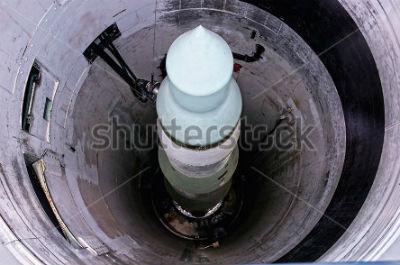The Long Nuclear Peace:
A B-Plus for the Human Race?
By Neil Earle
St. Paul counseled Christians “In everything give thanks,” a healthy and timeless piece of advice.
It would be remiss to let the month of August pass without a reference to the 70th anniversary of the bombing of Hiroshima and Nagasaki and not remember that none of the deadly bombs have been dropped in 70 years and that no major war between great powers has eventuated since 1945.
Independent journalist, professor and documentarian Gwynne Dyer gave a smiliar hope-filled evaluation in his August 8, 2015 column titled “Seventy Years without a nuclear war.” No cock-eyed optimist, Dyer authored “War” in 1985 while an instructor at the British military academy at Sandhurst. He now touts the period 1945 to 2015 as representing “an impressive accomnplishment.”
 So far the weapons of Armageddon have been resting in their silos.
So far the weapons of Armageddon have been resting in their silos.Job Number One
Certainly Job Number One in the nuclear age is avoiding any kind of nuclear exchange. President Truman presided over Hiroshima and Nagasaki in August 1945 but then refused to use them when United States and United Nations forces were fleeing south from North Korea in 1950 with thousands of casualties resulting. Against much pressure, Truman refused to use the bomb as a battlefield weapon. Eisenhower ducked similar pressure from his military in 1955 when the French were losing Vietnam. And President Kennedy was the one true “no nukes” guy in his cabinet during the Missiles of October crisis in 1962.
Dyer speculates it may have been the horrific pictures of Hiroshima and Nagasaki that entered into these decisions. Plus the Soviet Union had the bomb by then so deterrence had definitely arrived. Dyer adds: ‘Once both sides get nuclear weapons they get more cautious.” This in fact has happened between other non-Western nuclear powers – notably China, India and Pakistan and may cast (hopefully) a new light on recent negotiations with Iran.
Adds Dyer: “In the following decades many military theorist have worked hard to come up with strategies that would make nuclear weapons useful in war, and many scientists and engineers have worked on new technologies that would achieve the same objective. But nobody has ever had enough confidence in their promises to use even one of these weapons in war.”
This would unleash the nuclear genie as the phrase goes. Though if terrorists got hold on a device this might be whole new game – hence our scoring B plus not A minus on this subject. As Dyer reminds us, the number of nuclear weapons peaked in the 1980s at around 50,000 and the US and Russia still own 93% of them. Though seven other countries have now joined the club still nobody has used one.
 Gwynne Dyer, specialist on international conflict.
Gwynne Dyer, specialist on international conflict.“Sleeping on a Bomb”
One clear lesson of the 1900s is that major powers must not get sucked into a confrontation with each other. Limited wars and insurgencies are cruel enough and devastating for the people involved as we see in Syria and Iraq and elsewhere. Yet this 70 years of no great power conflict is “a first in world history” says Dyer. He summarizes: “Is this because the two world wars had been so destructive that they created institutions like the U.N. Security Council to avoid another, or because they knew that great power wars would probably be nuclear wars?”
Perhaps. And something else. Though mercilessly attacked at times the United Nations is usually involved in some of these dangerous power plays even if at the periphery. We saw this in the dangerous nuclear showdown over Cuba in 1962. That October U.S. representative Adlai Stephenson undercut the claims of Soviet delegates about “we have no missiles in Cuba” before a worldwide audience. Every little bit helps. At its founding, Winston Churchill opined that “the purpose of the UN was not to lift us to heaven but to save us from hell.”
So far, the long nuclear peace has held. In Dyer’s modest summary, the human race is “making progress.”
If this is correct than perhaps reasonable Christians can breathe a silent prayer of thanksgiving to God, as I wrote in a religious magazine on the 50th anniversary of Hiroshima in 1995. Psalm 91 has been a favorite text in our bedside Bibles: “You will not fear the terror of night nor the arrow that flies by day…He will cover you with his feathers and under his wings you will find refuge; his faithfulness will be your shield and rampart” (Psalm 91:4-5).
For decades we have been sleeping on a bomb as one Christian figure reminded us in the 1970s. Thank God, neither the worst fears of movie makers, of seasoned statesmen or apocalyptic preachers have taken shape. Yes, thank God for that.